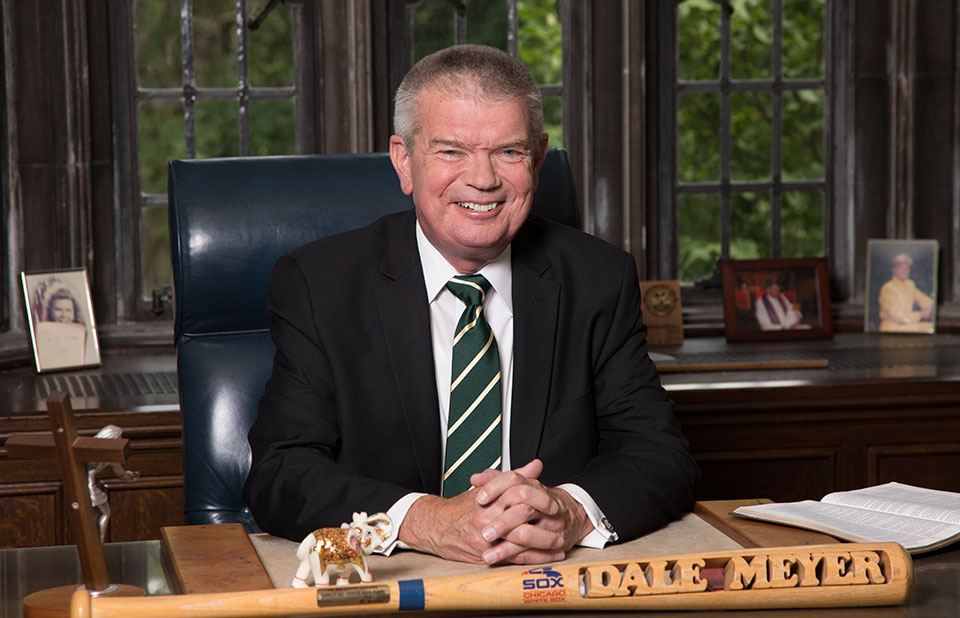
Concordia Seminary Newsroom
Dear alumni

Home from Tampa, please permit me a few comments about The Lutheran Church—Missouri Synod (LCMS) convention actions relevant to your Seminary.
My optimism for the future of the LCMS took giant steps forward as I saw many recent Concordia Seminary graduates serving as delegates and heard them speak with love and care for the wider church. In an age when many people are indifferent or even hostile to institutions — especially the institutional church — our younger delegates demonstrated their passion for a healthy, faithful and mission-oriented Synod. Older grads did that too, but because we’re closer to heaven, I’m especially focused on our younger brothers and sisters. It’s easy to let district and national church structures slip out of our minds when we’re doing ministry locally, but that can weaken our local witness. We need one another. Thanks to all delegates!
“We are Your Seminaries for the Gospel” was the theme for our first-ever combined exhibit and alumni reception by Concordia Seminary (CSL) and Concordia Theological Seminary, Fort Wayne, Ind. (CTSFW). The collaboration of our seminaries also was seen in the convention hall as CTSFW President Dr. Lawrence R. Rast and I together and in agreement addressed several resolutions about the seminaries. Our cooperation is genuine and we seek to be a unifying presence in our Synod. Thank you, President Rast and Concordia Theological Seminary!
Resolution 1-05, “To Strengthen Multi-Ethnic Outreach,” included this resolve, “That Synod reaffirm the formation of church workers through the Ethnic Immigrant Institute of Theology, Center for Hispanic Studies, and other such programs …” This is part of the Strategic Plan for your alma mater.
Resolution 6-01, “To Support and Participate in the Comprehensive Church Worker Recruitment Initiative.” This most important effort will complement efforts energetically being led at CSL by Associate Provost Dr. Benjamin Haupt.
Resolution 6-02, “To Promote Residential Seminary Education as the Preferred Option for the Preparation of Men for Pastoral Ministry.” The word “preferred” generated all kinds of discussion. The seminaries offer several routes to pastoral ministry, some especially suited for unique contexts in today’s diverse American culture (e.g. Center for Hispanic Studies and Ethnic Immigrant Institute of Theology). The resolution was not intended to diminish these programs (see Resolution 1-05 above) but simply to say that the Synod’s backbone program for pastoral formation will continue to be residential (Master of Divinity and Residential Alternate Route).
Resolution 6-03A, “To Enhance the Specific Ministry Pastor (SMP) Program,” also generated much discussion. What does the resolution mean? From our SMP director, Dr. Mart Thompson: “First, I will say that this resolution makes no changes nor does it require future changes in the SMP Program, but it does call for study and review of certain aspects. Secondly, the resolution expressed appreciation for SMP pastors and all involved in the SMP programs at our seminaries, districts and Synod. That tone of gratefulness was also apparent in the majority of the comments made both in the floor committee hearing that took place before the convention and on the convention floor when the resolution was discussed.”
Floor discussion convinced me that many people do not have an adequate understanding of the unique and highly niched purpose of SMP. Please watch Seminary publications in the coming academic year for accurate information as we try to make more people knowledgeable about this Synod-mandated program.
Three resolutions (the above mentioned 6-02 and 6-03A and a resolution about continuing education, 6-04) call for study and report by the Pastoral Formation Committee (PFC). The PFC was establish by the 2016 convention, my words now, to monitor pastoral formation programs in the LCMS. To read the exact charge to the PFC, see the Handbook, Bylaw 3.10.4 to 3.10.7. The committee has three voting members: the Chief Mission Officer of Synod and the two seminary presidents. An advisory member is the LCMS Executive Director for Pastoral Ministry. Bylaw changes sometimes prove wise, other times unwise, but all four members of the PFC believe this was an excellent move and we eagerly look forward to the studies and reports mandated to us by these resolutions.
Life together in this Synod has its moments. Let us beseech our Lord Jesus to impart to us all — alumni, current and future seminarians — a passion to live in and model His words to all, to nurture His people and bring more and more into the love of His church. Christ’s coming in the flesh shows that His mission takes incarnate expressions, and that includes our institutions, congregations, districts and Synod. As we prepare for a new season of activity, let’s speak frequently and act in accord with Whose we are. As President Dr. C.F.W. Walther said about our life together, “You may believe me when I say that in the entire course of the history of the Church there will be found few communions that have such achievements to show as our Synod spite of its weaknesses and defects. That is not due to our prudence, our hard work, our self-denial. The true reason is that we have really preached the genuine Gospel to the people” (Law and Gospel, 407).
Dale
Dr. Dale A. Meyer, President
Concordia Seminary, St. Louis